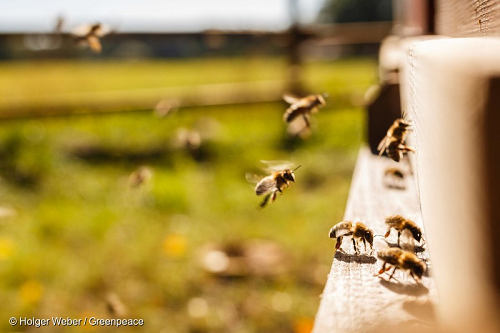Three neonicotinoids down, more bee-killing pesticides to go
European governments have backed a European Commission plan for a near-total ban of three bee-killing neonicotinoid insecticides. Representatives from 16 countries meeting in Brussels voted in support of the EU ban.
Four countries opposed the ban and eight abstained. The countries supporting the ban were: France, Germany, Spain, Italy, the United Kingdom, the Netherlands, Austria, Sweden, Greece, Portugal, Ireland, Slovenia, Estonia, Cyprus, Luxembourg, Malta, representing 76.1 per cent of the EU population. Those opposing were: Romania, the Czech Republic, Hungary and Denmark. Those abstaining were: Poland, Belgium, Slovakia, Finland, Bulgaria, Croatia, Latvia and Lithuania.

Greenpeace EU food policy adviser Franziska Achterberg said: “This is great news for pollinators and our wider environment, but there was never any question that these three neonicotinoids had to go. Now the EU must make sure that they are not simply swapped with other harmful chemicals. These three neonicotinoids are just the tip of the iceberg – there are many more pesticides out there, including other neonicotinoids, that are just as dangerous for bees and food production. Governments must ban all bee-harming pesticides and finally shift away from toxic chemicals in farming.”
The ban will extend a 2013 partial ban of three neonicotinoids – Bayer’s imidacloprid and clothianidin, and Syngenta’s thiamethoxam – to cover all open-field uses, but allows their use in permanent greenhouses.
Research indicates that several other insecticides are a threat to bees and other beneficial insects, including four neonicotinoids currently authorised in the EU - acetamiprid, thiacloprid, sulfoxaflor and flupyradifurone - and other insecticides, like cypermethrin, deltamethrin and chlorpyrifos.
Failure to address the wider chemical burden on bees could mean that farmers simply replace banned chemicals with other permitted chemicals that may be just as harmful, warned Greenpeace. To avoid this, the EU must:
● ban all neonicotinoids, as France is considering;
● apply the same strict testing standards to all pesticides;
● dramatically reduce the use of synthetic pesticides and support the transition to ecological methods of pest control.
Source: Greenpeace European Unit
- 293 reads
Human Rights
Ringing FOWPAL’s Peace Bell for the World:Nobel Peace Prize Laureates’ Visions and Actions

Protecting the World’s Cultural Diversity for a Sustainable Future

The Peace Bell Resonates at the 27th Eurasian Economic Summit

Declaration of World Day of the Power of Hope Endorsed by People in 158 Nations

Puppet Show I International Friendship Day 2020

